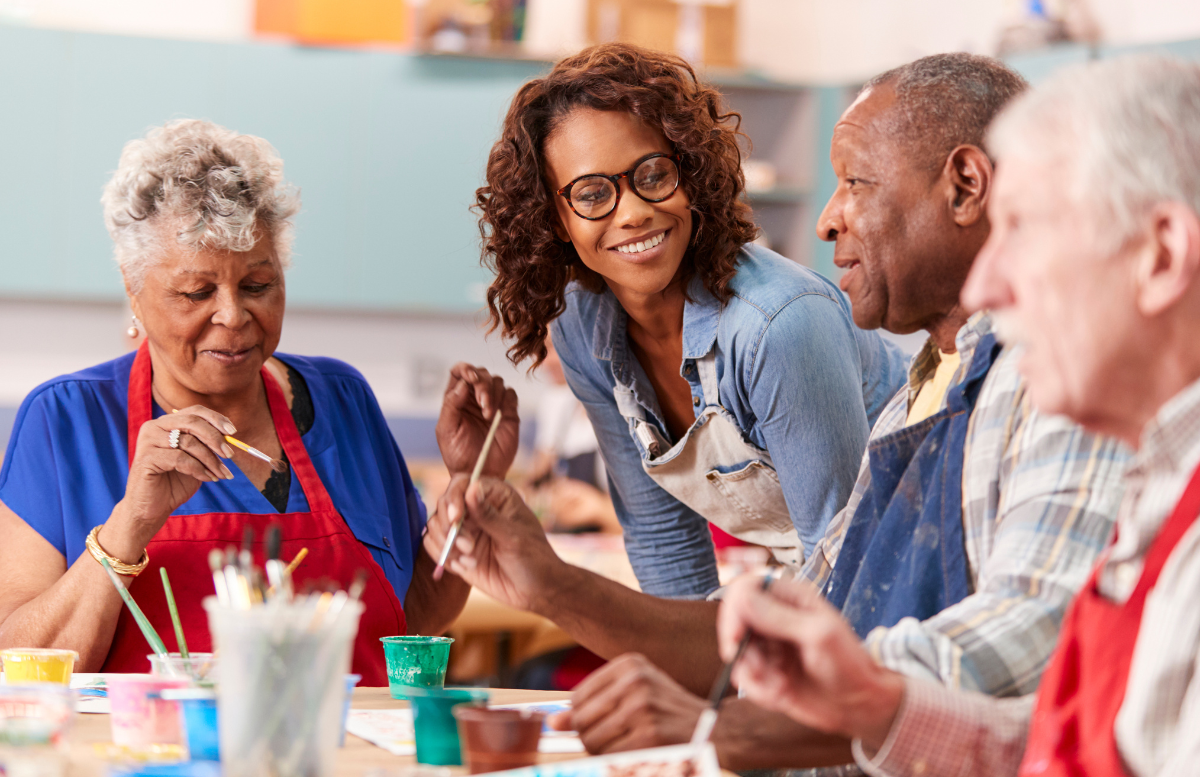
Benefits of Doing Creative Projects with Aging Loved Ones
Fundamental cognitive capabilities are activated and renewed when aging loved ones participate in creative, sensory-stimulating activities. Although this is true for the entirety of the human lifespan, it becomes increasingly crucial as we get older.
Creative Projects with Aging Loved Ones
What form of creative endeavor is suitable for people with dementia or cognitive difficulties is the question at hand. The truth is that as long as someone is having fun, anything is acceptable.
Remember that some art projects are more fun with friends, and the trick is to offer the activity in a way that appeals to everyone and invites involvement.
The arts are a natural community and group builder. Here are a few success tips and strategies.
IDEAS FOR PROJECTS
Buy a few paper rolls for the cash register. Use watercolor paints to cover the paper with color as you roll out the paper a few inches at a time. Alternate colors as frequently as desired.
Use black markers to create lines in the color once the paper has dried. Hang the rolls in various lengths in front of a window or entranceway once they are all colored and lined.
Additional sensory stimulation is provided by the sound of the paper moving and the colors and light reflecting through the paper. This is a fantastic activity that people of different ages can enjoy together.
Start with a lump of clay the size of an egg using Play-Doh or another nontoxic material to create the miniature sculpture garden. Create or add a head to the lump first. Investigate further what can be added to and subtracted from the form to produce a finished result.
When it’s feasible, chat through the procedure to promote verbal communication.
Sculptures can be created by each person in the group. When working alone or in a pair, each person can produce several. To make a miniature sculpture garden that may be enjoyed and played with while the clay hardens, place the sculptures on a plate with artificial grass or moss.
Music Can Improve Enjoyment
Have a variety of tunes prepared to play.
Play a song and start tapping your fingers to the beat.
Modify the music. Swap out the paper. Repeat.
SUCCESS SUGGESTIONS
Put happiness first, not performance. The technique and sensory stimulation are more crucial than the finished piece of art.
Help the group get going. The majority of people with dementia still have the drive and enthusiasm to engage, but they might not be able to organize, plan, start, or finish the task.
Provide guidance and support. You might need to demonstrate the task several times for the person while still giving clear, uncomplicated instructions. But don’t finish the project on their behalf.
Be adaptable. When someone is adamant that they don’t want to do something, it may be because they are unable to do it or are afraid of doing it. Avoid pushing it. Allow them to venture out and do it their own way if the person insists on carrying it out differently.
Don’t correct or condemn the person. Encourage the person to keep going if they love the activity despite not adhering to the rules. Promote self expression.
Identify a relationship. If you ask someone to make a card, they might not oblige. However, if you tell your friend that you’re working on a unique get-well card for someone and offer them to help, they might like helping.
Engage the individual in dialogue. While conversing, inquire about the person’s activities. Even if the other person is unable to react, your communication will probably still be helpful to them.
Check back later. When something doesn’t work, it could simply not be a good time of day for them, or that the task is too difficult. Attempt it again later or modify the activity.
READ NEXT: What is Aqua Therapy for Seniors?
